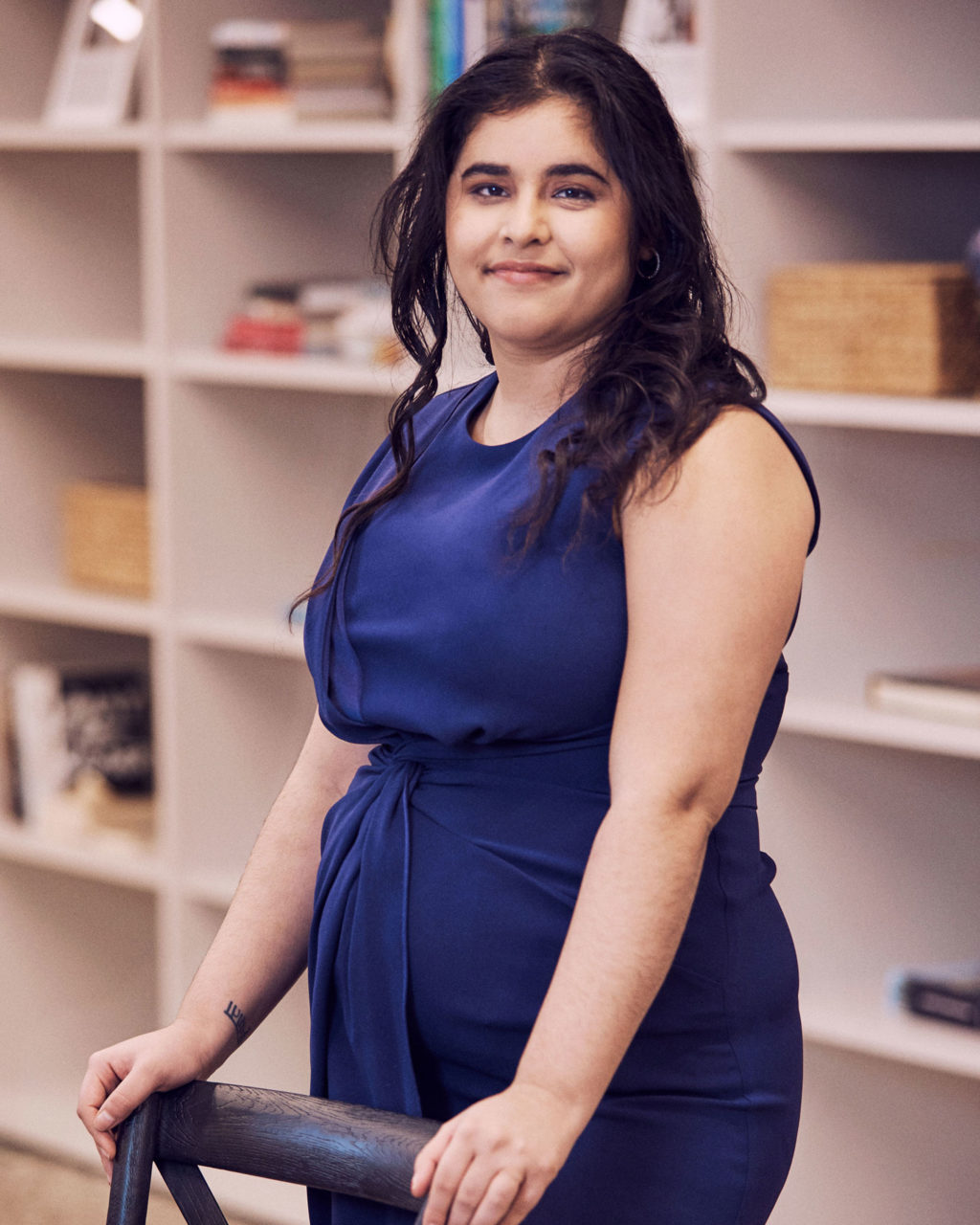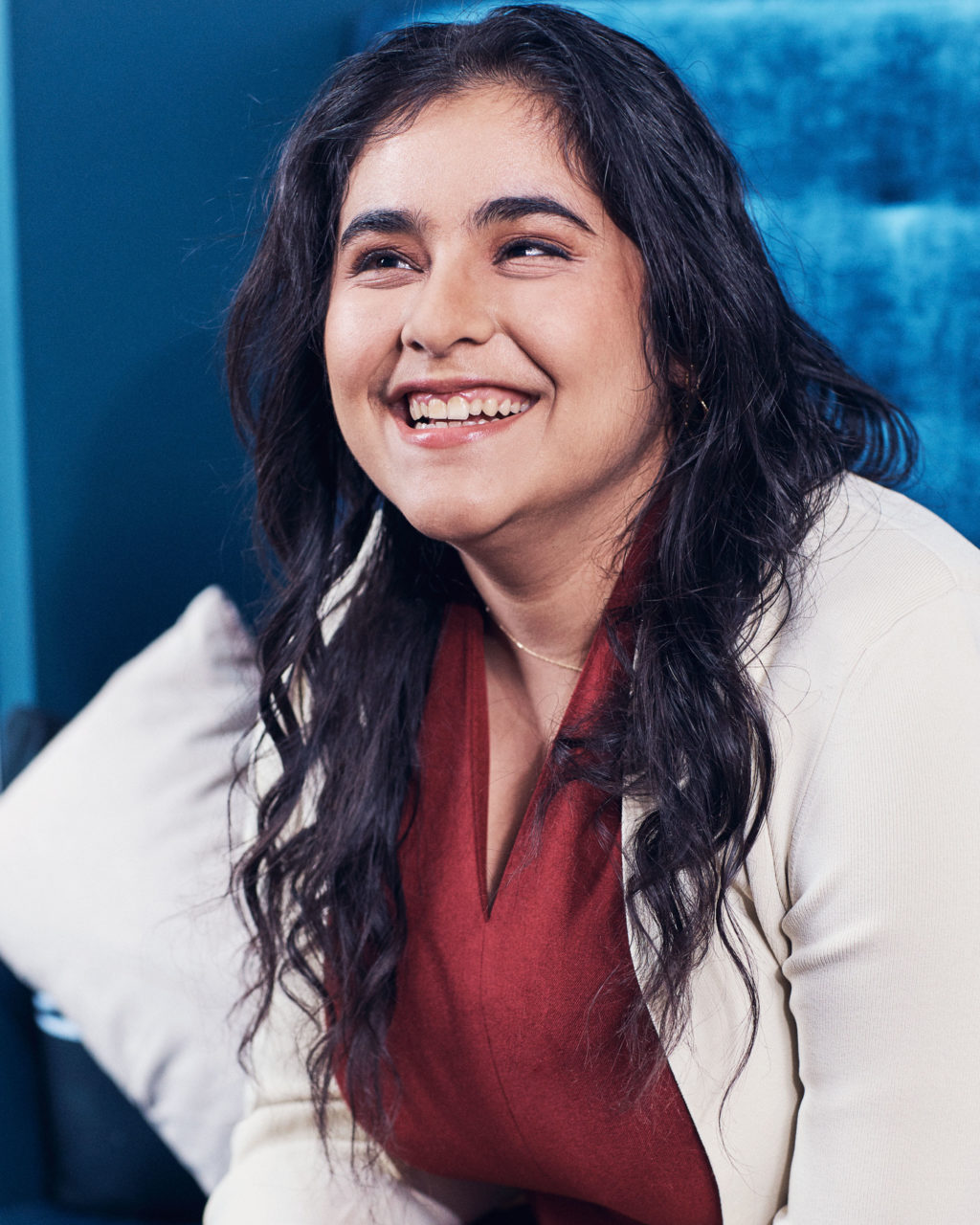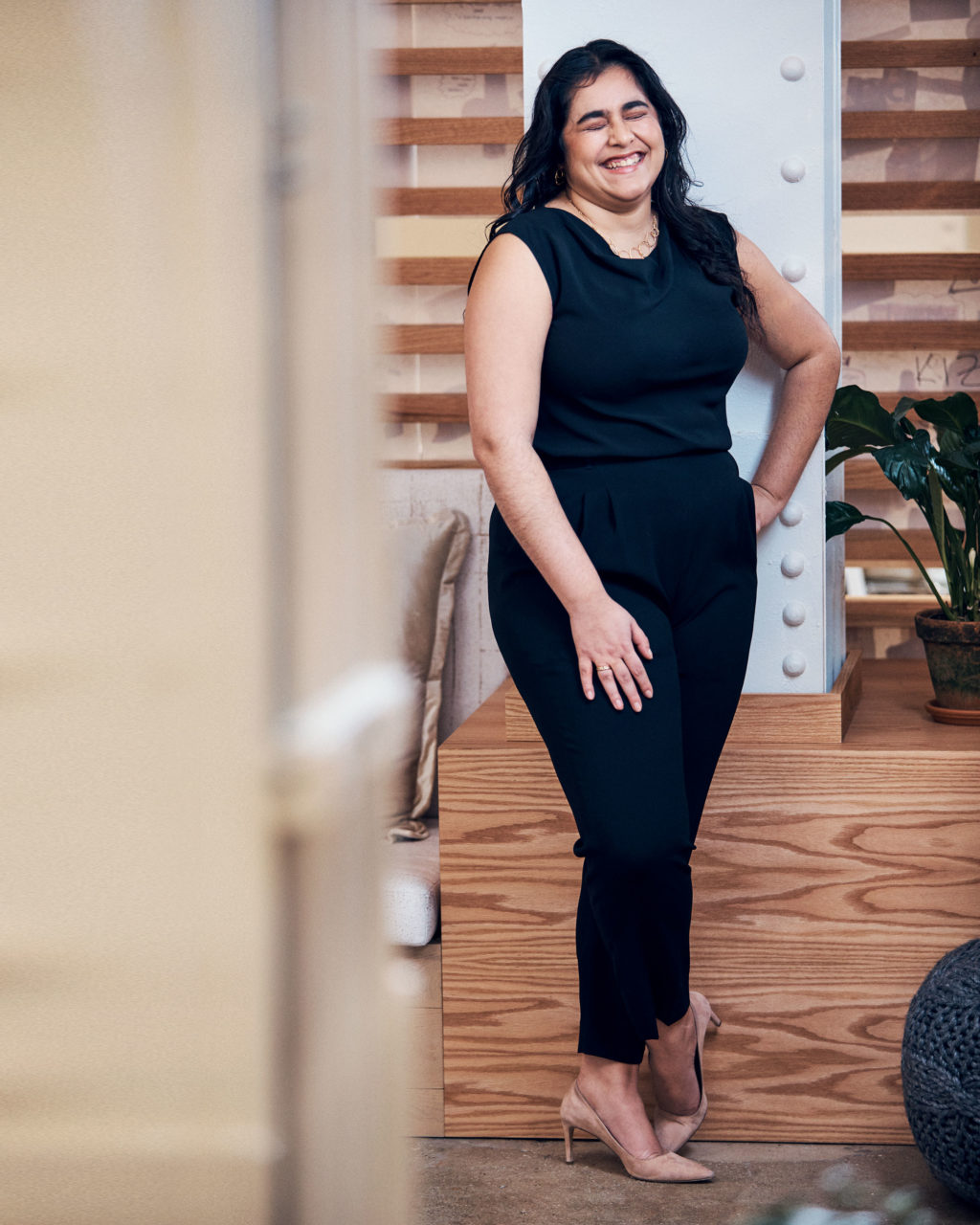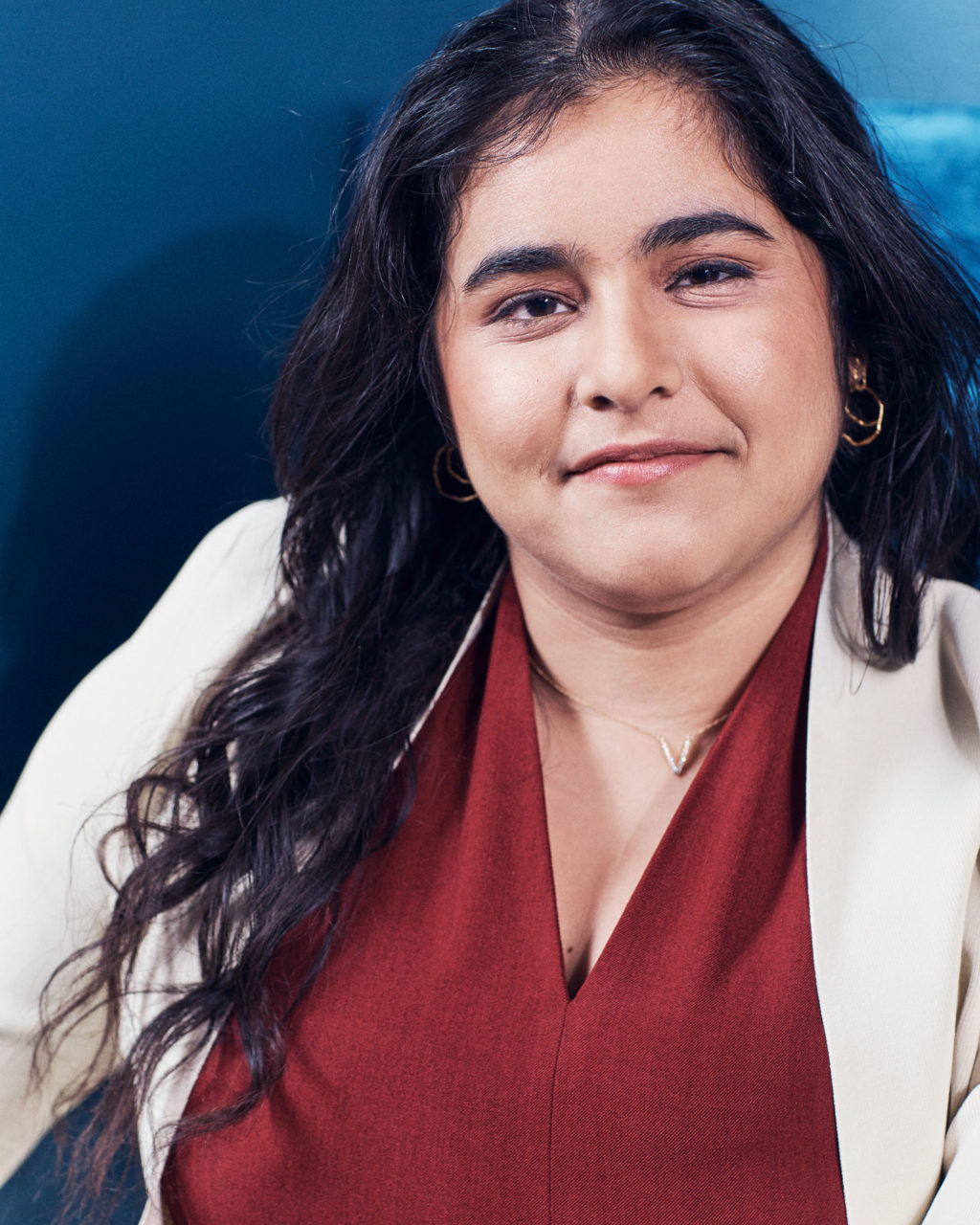Lawyer and Activist Aditi Juneja: Why She Loves the Word ‘Unsolicited’
February 23, 2018 | Filed in: Woman of the Week
Aditi Juneja is a lawyer, writer, and activist. While she was a law student at NYU in 2017, she became a co-founder of The Resistance Manual, an open-source platform that educates citizens about legislative and policy issues and how to act on them. Now a newly-minted member of Forbes’s 2018 “30 Under 30” list, she sat down with us last week to discuss the pitfalls of “unsolicited” opinions, what it’s like to manage epilepsy at work, and her podcast “Self Care Sundays.”
FROM THE TIME I WAS FIVE, I would introduce myself to people by telling them, with great confidence, that I wanted to be the president of the United States. Then, in third grade, when I found out that you have to be born in the United States to be president, I was devastated because I was born in India. So then I decided I wanted to become a senator and change the rules.
WHEN I WAS GROWING UP, my parents encouraged us to pursue our own interests, as long as they didn’t limit our options. I did a lot of musical theater in school, and my sister played basketball through college. She’s now in medical school. I joke that my parents ended up with a future doctor and a lawyer because they didn’t pressure us—reverse psychology.

Aditi wears the Taylor dress in deep indigo and the Pave hoops in silver.
I LEARNED AT AN EARLY AGE how much we define ourselves in relation to other people. In middle school, I was the “smart one”—I sat at the smart kids’ table at school, and it was a source of great pride. After eighth grade, I went to a private school, and almost all of my classmates were wealthier and white. My skin color became a much bigger part of how others viewed me. Because I wasn’t white, I was expected to speak to a specific experience—namely, one of urban poverty. But that’s not how I grew up; my family was upper-middle class in the suburbs. It felt icky to me to try to differentiate myself from other people of color—to say, “No, I’m not like those people.” At the same time, I didn’t want to claim an experience that wasn’t mine. As a 13-year-old, I didn’t have the vocabulary to say, “Racial groups are not monolithic,” or, “Yes, my skin is brown, but ethnically I identify as Indian-American, and because of our immigration system we have a lot of privileges relative to other people who look like me but who may be Latino.” That’s when I started getting interested in social justice and the systems and policies that shape it.
I WAS AN ECONOMICS MAJOR IN COLLEGE, and I had a great professor who was a Latina woman. She was an immigrant like me, and I wanted to work hard for her. I never did super well in her classes; it was more about having someone I wanted to perform for, who was invested in me. She taught me that the way you make change is by thinking about incentive structures. I may not always understand why people behave the way they do or have certain beliefs, but I can think about how to incentivize them to change that behavior or belief.

Aditi wears the Aditi dress in pomegranate, the Sant Ambroeus jardigan in ecru, and the Small Victory necklace.
IN MY FRESHMAN YEAR PHILOSOPHY CLASS, we read Hannah Arendt’s Eichmann in Jerusalem: A Report on the Banality of Evil. It’s about how evil is not one unified force; it’s not Lord Voldemort. It’s ordinary and normalized and takes over little by little. That year, I also read about the Milgram and Stanford prison experiments. They made me realize that there is no one in charge of “fixing” things. Since the 2016 election, I kept coming back to the same thought: If Times Square becomes Tiananmen Square, I want to be there. If shit is going to go off, I need to be in the middle of it. I’m not going to be on the sidelines. If no one is coming to save us, we have to save ourselves.
DURING AND AFTER THE ELECTION, a lot of news stories were focused on the horse race—who’s winning, who’s losing, who’s popular—as opposed to what will have a direct impact on people. I thought, Wouldn’t it be great if we could cut through the noise, and collect policy information all in one place? So I created a table of 15 different policy areas, and asked the following questions about each:
- What is the process through which this policy gets done?
- Where are there opportunities for citizens to act?
- What are the policy’s vulnerabilities?
- Where does it intersect with state law?
That was the beginning of what is now The Resistance Manual, which was formed in an effort to inform people—and maybe debunk some myths in the process.

Aditi wears the Rowling top and the Howland trouser in black, the Helene necklace, and the Vanessa pump in beige.
I DIDN’T NAME THE RESISTANCE MANUAL; if I had, I would have called it something less politically charged. We were always clear that we would not degrade the president or his supporters. Our mission was not to resist the president, but to protect and advance equality and justice with facts that were properly cited and sourced. When people felt unsure about something, we wanted to be a place for them to get information. Still, I have a lot of guilt about having gained a platform and some prominence during this moment, and I think some of my peers feel the same way.
IN APRIL, I CREATED A PODCAST CALLED “SELF CARE SUNDAYS”, where I started asking people in different professions how they take care of themselves. The big takeaway from the first season is that you have to create boundaries. For me, those are physically built in: I have epilepsy, which means I’m required to sleep. It’s not an option. In that sense, my epilepsy informed my sense of leadership in a positive way, because it made me aware of my boundaries. Having a seizure disorder also means that mornings are difficult. I have some side effects from my medication, and I don’t feel great when I wake up. In the past, it would have been hard for me to talk to my superiors about that and request an accommodation. But now, I’ve let it go. I’m still putting in a day of work, I’m just starting the day a bit later.

Aditi wears the Taylor dress in deep indigo.
I’VE BECOME A BIG FAN OF THE WORD “UNSOLICITED.” It’s partly a gendered thing—women get a lot of unsolicited advice from men, in particular, so now I try to notify someone when their advice is unsolicited. My dad is the one who struggles with it the most, because he has also given me the best advice in my life. It created a real change in our relationship for me to say, “Please only give me advice if I ask for it.” It’s a bit awkward, and it’s important to warn people in your life that you’re going to start doing it. But I also found that I was just as guilty of giving unsolicited advice. Now, before I give my opinion, I ask people if they want it. In drawing that boundary for myself, it’s made me more respectful of other people’s boundaries.
I FEEL LOST IN MY CAREER ALL THE TIME. I think anyone who doesn’t say that is lying, and I think more of us should admit it. The year that I was running The Resistance Manual, I was terrified every day. I didn’t know what I was doing. But that’s also where the fun is. As my dad says: Focus less on what you want to do and more on why you want to do it. This year, I have a day job, so my life is more scheduled and calm. I’m at the office for eight hours every day, and then I’ll come home and open up my laptop and see what else I feel like doing. I’m working on professionalizing some of the skills that I developed last year—I went to a workshop to learn how to write better op-eds, for example. And lately, I’ve been thinking a lot about other goals in my life, like living someplace with a beach nearby. Not when I’m 80; right now. I’ve been asking myself: How do I organize my life so that I’m in a more joyful place?

Aditi wears the Aditi dress in pomegranate, the Sant Ambroeus jardigan in ecru, the Oberon earrings, and the Small Victory necklace.
I NEVER WANT TO FEEL LIKE MY APPEARANCE is a distraction. When I’m getting ready in the morning, I’m aware that I am a woman, an immigrant, a person of color, and a person who has publicly spoken about having a disability. I’m also a lawyer. So I try to put myself together in a way that doesn’t take attention away from the substance of who I am. I tend to overdress, and look more professional than most of the people around me. Of course, I don’t think it’s fair that I might be penalized for how I look while a white guy sitting next to me wouldn’t be, but that’s not the hill I want to die on. There are more important battles to be fought. It’s a double standard, but I want to fight other double standards.
I ORIGINALLY FOUND MM.LAFLEUR because I saw that it was “for women who don’t like to shop.” I was like, “That’s me!” The shopping experience in the showroom was the first time that no one told me I was difficult because of my body type. I don’t think I have a strange body, but I’m busty and have a smaller waist, and I’m very specific about what I will and will not wear. In the showroom, the stylists were like, “Oh, great. That narrows down the possibilities and makes our job easier.” I wasn’t treated as a problem to be solved. I’ve now worn MM for TV appearances and to the Forbes “30 Under 30” party. The only thing I have to worry about is not repeating the same outfits when I might have my picture taken—the rest is easy.
Photographs by Jeff Allen.





